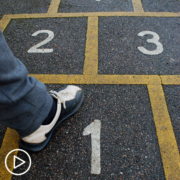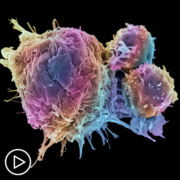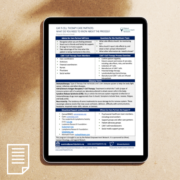CAR T-Cell Therapy | What Are Potential Complications?
CAR T-Cell Therapy | What Are Potential Complications? from Patient Empowerment Network on Vimeo.
CAR T-cell therapy may cause complications and side effects that their care partners should be aware of ahead of time. Expert Dr. Shambavi Richard reviews possible side effects, including cytokine release syndrome, and how patients are monitored during their hospital stay post-procedure.
Dr. Shambavi Richard is Co-Lead Physician for the Myeloma CAR-T Programs at Mount Sinai Tisch Cancer Center. Learn more about Dr. Richard.
See More from The Care Partner Toolkit: CAR T-Cell Therapy
Related Resources:

|

|

|
Transcript:
Katherine:
Dr. Richard, what are the potential side effects or complications of CAR T-cell therapy?
Dr. Richard:
So, there are several possible side effects with CAR T therapy.
It’s a little different from an autologous transplant. And I bring that up just to say because they are both cellular therapies, so are frequently compared and contrasted with autologous transplants which we have had for about three decades now. So, the main side effect after CAR T therapy is something called CRS or cytokine release syndrome. So, that happens when CAR T cells recognize the myeloma cells and kill them. A host of chemicals called cytokines are released in the body. And this can make a person feel like they have a bad case of the flu. So, it may be things like fevers, chills, body pains, headaches, loss of appetite, nausea, fatigue.
So, these are some common symptoms of cytokine release syndrome. But these are the milder forms, so in more severe cases of cytokine release syndrome, you can have things like drop in blood pressure, drop in oxygen levels, needing supplementation with oxygen.
Or in terms of drop in pressure, they may need fluid resuscitation or sometimes even pressors, blood pressure medications that help to boost the blood pressure. So, that’s one major side effect. Another is something called neurotoxicity.
So, you can have neurological side effects from CAR T therapy which when it occurs in the setting of CRS, that’s called ICANS or immune effector cell-associated neurotoxicity syndrome. That’s what that acronym stands for. And it has a constellation of symptoms such as confusion, disorientation, difficulty with some common everyday tasks. The handwriting may go off, attention deficit, things like that. But then in more severe forms of ICANS, you can actually have lethargy, coma, seizures, brain edema, so much more scary things.
Then there is another form of toxicity called delayed neurotoxicity which looks completely different. Now you have things like Parkinson’s disease or neuropathies. Either cranial nerve neuropathies or peripheral neuropathies, Guillain-Barre which is a kind of ascending paralysis. So, all of these are also possible as neurotoxic side effects from CAR T therapy.
Aside from these, there is another which is called HLH or macrophage activation syndrome or hemophagocytic lymphohistiocytosis syndrome wherein patients can have organ toxicity, a spiking ferritin levels, new fevers, new neurotoxic symptoms, additional lab abnormalities such as liver function test abnormalities. So, these are other forms of just general CAR T-cell toxicity.
Then in addition to these, you can have infections, prolonged blood count abnormalities, cytopenia as we call it which can affect the white cells or the platelets or anemia and things like that. So, these are also possible. And then finally things like second primary malignancies which can happen, other malignancies that can happen that may be related to CAR T therapy. A lot of these are still being studied. We don’t have a good understanding of how frequently this happens. But these are all possible side effects of CAR T therapy.
Katherine:
Do any of the complications have to result in hospitalization? Or can patients be treated outside the hospital?
Dr. Richard:
So, the way things stand now, and this may be slightly different depending on the specific CAR T product.
But we generally keep patients hospitalized for the first two weeks after the cell infusion. Most of the side effects such as the CRS and the ICANS tends to occur during this hospitalization phase. HLH and delayed neurotoxicities can occur while they’re still in the later phases of the hospitalization, or it can occur late after they get discharged from the hospital. Infections and cytopenias of course can happen for a while following CAR T therapy.
Once they are discharged from the hospital, we ask that they stay close to us, usually within an hour or two of the hospital so that they can quickly come back in if there’s any issues. We see them quite frequently once they get discharged from the hospital. I see them at a minimum of once a week, more frequently at least a couple times a week, or even three times a week depending on what their blood count needs and monitoring needs are.
So, we have them stay close to the hospital if they are far away. And the sponsor and our social worker, insurance can work together to figure out how to help them with the hotel costs if they have to stay close to us. So, that’s for an additional two weeks after they’ve discharged from the hospital. Following that, patients go back to their homes, but we still follow them quite frequently depending on what their needs are in terms of possible side effects.










